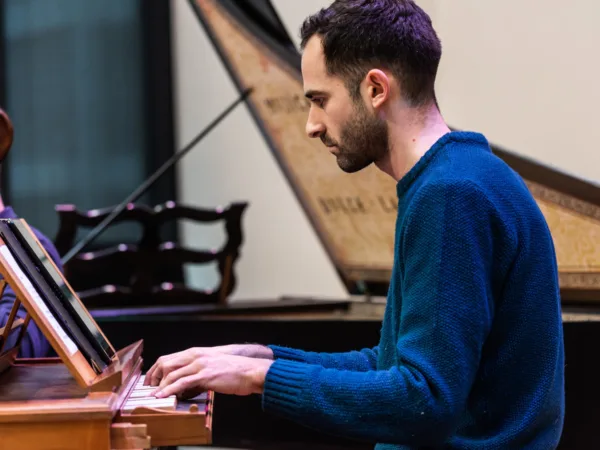The activities described in this article took place before the coronacris in The Netherlands.
An audience of curious onlookers is quickly gathering. Here in the archives of Erfgoed Leiden, the heritage institute for the region of Leiden, the air is filled with the sound of singing. What is going on? A group of students from the Royal Conservatoire are bringing the treasures of the archive to life as they sing from an original choir book from the collection of Leiden’s Pieterskerk.
According to the archivists, the students are probably the first musicians to sing directly from the manuscript since the Iconoclastic Fury during the Reformation. The singers are members of a club formed by twenty students from the Royal Conservatoire, who meet every week to study and sing historical vocal repertoire from the original notation. The diverse group is made up of instrumentalists from the Early Music department and vocalists from the Early Music and Classical departments. The course material is completely new to at least two-thirds of the students.
The club is led by Tim Braithwaite. Tim is a singer and a teacher at the Royal Conservatoire, whose classes include ‘Historical Development of Singing’, a compulsory course for all vocal studies students. In addition to his teaching, he is currently completing his Master’s studies in Early Music Theory. ‘Last year I was a teaching assistant in the elective “Franco-Flemish polyphony,” which covers vocal music from the 15th and 16th centuries. The course is not on the syllabus this year, but the students and I were very interested in continuing to study the subject.’
And so a club was born. Their chosen theme this year is music from Dutch sources, with a focus on choir books in Den Bosch and Leiden. ‘Both archives are extensively digitised. The music can be found online and downloaded. However, since Leiden is so close to The Hague I had the idea of bringing the students here to sing directly from the original choir book. I sent an e-mail to the archives and they agreed immediately.’ In the archives in Leiden,the students were able to experience for themselves what it was like to sing from choir books in the 15th and 16th centuries. Tim: ‘What immediately stands out is how the choir is arranged. The choir book is large enough for everyone to read from it, so the singers are all clustered around it. This creates a real feeling of making music together.’
‘I am really grateful for the enthusiasm shown for this project, not only by the students, who are taking part on a purely voluntary basis – they do not earn any credits for it – but also by the archives, which greeted us with open arms. Indeed, we have even begun discussing hypothetical plans for future projects such as the possibility of arranging a concert from the books themselves.’ When he has completed his Master’s, Tim will continue to teach at the Royal Conservatoire, alongside his work as a singer and a researcher.
Video: Erfgoed Leiden made a video of the students while singing







